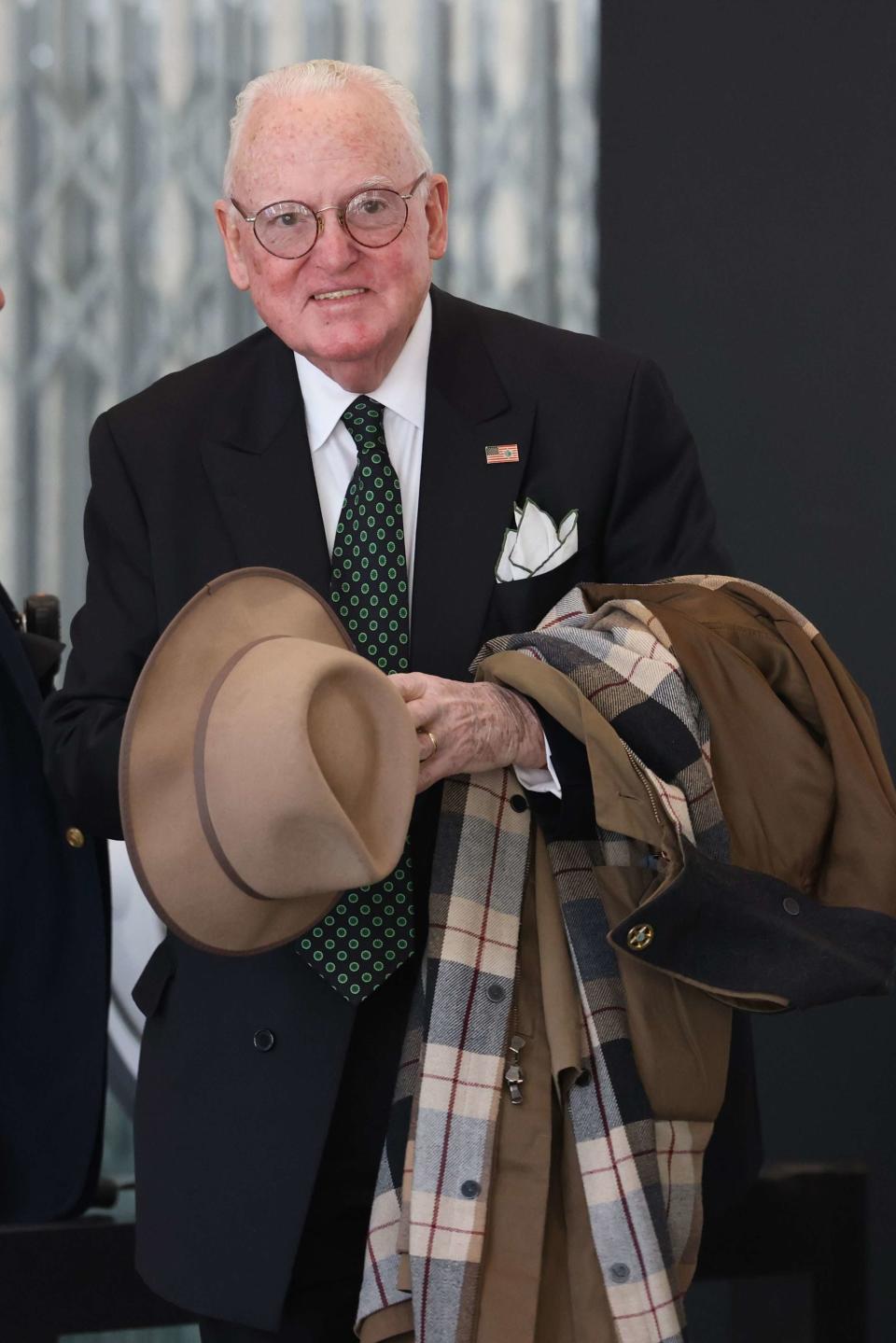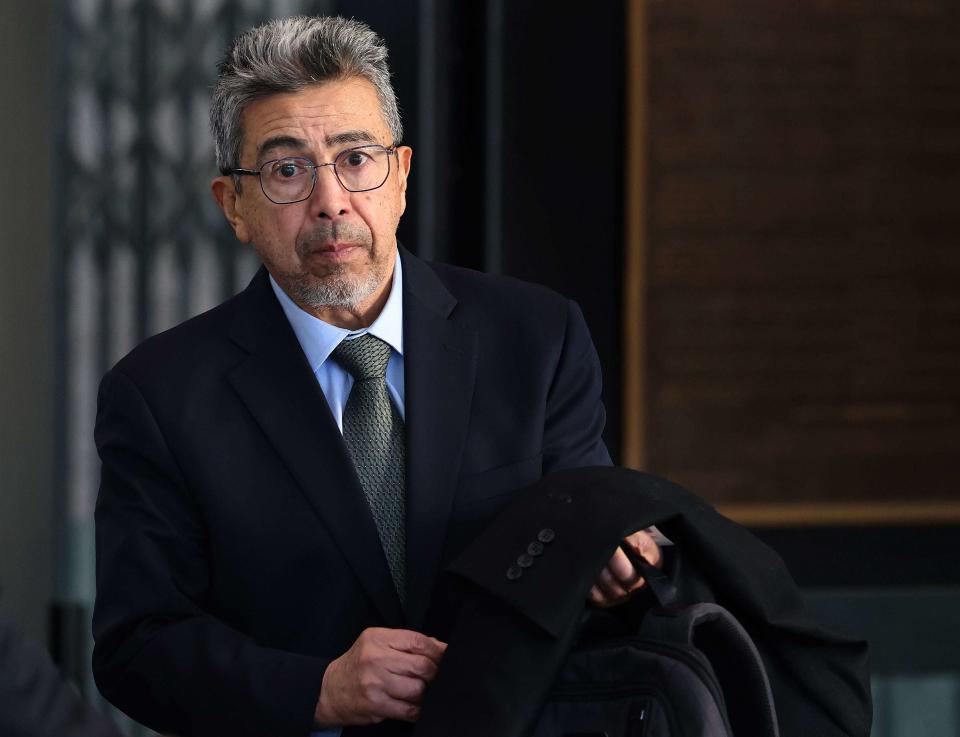‘I was working under the direction of the government’: Calm and cool former alderman and FBI mole Daniel Solis heats up Ed Burke corruption trial
- Oops!Something went wrong.Please try again later.
- Oops!Something went wrong.Please try again later.
The last time Daniel Solis and Edward Burke were in the same room together was November 2018, when the two powerful longtime aldermen talked about Solis’ future.
Solis said on the secretly recorded video that he planned to retire in the middle of his next term, maybe become a consultant and “go off into the sunset.” He told Burke he’d still bring developers his way, looking to hire Burke’s private law firm for tax work, “as long as, you know, you remember me.”
Burke promised he would scratch Solis’ back, telling his trusted colleague, “We come from the old school.”
Five years later, those two old-school Chicago politicians finally met again on Tuesday. This time, though, it was in federal court.
After much anticipation, Solis was called to testify about his improbable turn as an FBI mole in the investigation that torpedoed Burke’s five-decade aldermanic career.
But his testimony in Burke’s corruption trial came with a twist: He was called not by prosecutors, who used the secret recordings he made of Burke, including their final conversation, to build their racketeering case, but instead as one of only two witnesses in Burke’s defense case.
In a high-stakes roll of the dice, Burke’s legal team put Solis on the witness stand in an attempt to dirty him up, poke holes in his cooperation, and suggest that Solis enticed Burke and fed him FBI-scripted lies to try to get Burke to say incriminating things on tape.
Burke attorney Chris Gair also took the opportunity to slam Solis’ unprecedented deferred prosecution deal with the feds, asking in one memorable exchange near the outset of the testimony, “Now sir, your reason for agreeing to cooperate with the government was to save yourself, wasn’t it?”
“Yes,” Solis said.
Toward the end of his questioning, Gair had Solis confirm he was not expecting to spend any time in prison for his own misdeeds.
“You’re not going to be indicted for anything?” Gair asked.
“That’s correct,” Solis said calmly.
Solis’ long-awaited face-off with his old colleague marked a watershed moment in Burke’s high-profile trial, now in its sixth week at the Dirksen U.S. Courthouse.
He was on the stand for about three hours, after which federal prosecutors declined to question him and Burke’s attorneys rested. Closing arguments are expected to begin Wednesday afternoon and could last for three days.
Burke smiled broadly when court adjourned for the day, while Solis ducked into a cab on Dearborn Street with his lawyer.
U.S. District Judge Virginia Kendall’s 25th floor courtroom had swelled to capacity in anticipation of Solis taking the stand, with spectators including former Chicago Aldermen Tom Tunney, 44th, and Proco “Joe” Moreno, 1st, as well as a host of high-powered lawyers, some of whom popped in from other trials to watch.
Among those attorneys was Tom Breen, who represents ex-Illinois House Speaker Michael Madigan on his racketeering case. Solis also cooperated extensively against Madigan, making copious secret recordings, and could be called to the stand again in Madigan’s trial next year.
Called just moments after prosecutors had rested their case, Solis walked into the courtroom just before 1:30 p.m., stone-faced and grayer than he was when he left the public eye five years ago.
Across the room, Burke, dressed in a dark suit, green tie and pocket square, leaned back in his chair and tented his fingers in front of him. His wife, former Illinois Supreme Court Chief Justice Anne Burke, watched with other family members from the front row.
After some initial questions about Solis’ tenure in the City Council, Gair’s questioning quickly became loud and theatrical; he repeatedly thrust his fingers in the air, and his voice echoed through the crowded courtroom.
Solis, by contrast, answered almost entirely in quiet, mild tones, pausing occasionally to sip from a bottle of water or scratch his head. When he first took the stand, Gair had to ask him twice to sit closer to the microphone so everyone could hear.
Solis, the longtime 25th Ward alderman and Zoning Committee chairman, was questioned at length about the dozens of recorded phone calls and videotaped meetings he made of Burke that formed the backbone of the racketeering charges in the case.
Gair also noted the deferred prosecution deal Solis received from the U.S. attorney’s office in return for his cooperation, an agreement that will leave him without a criminal conviction even though Solis acknowledged that he knew he was facing potentially years in prison.
“This was not out of some public spirit on your part, correct?” Gair asked.
“I don’t know what you mean by ‘public spirit,’” Solis replied.
Gair responded with venom: “I know you don’t know what I mean by ‘public spirit,’ sir.”
Prosecutors immediately objected.
The early part of the testimony proceeded in fits and starts, with prosecutors frequently raising objections and the defense requesting sidebars.
In his seat at the defense table, Burke was somewhat fidgety, stroking his chin, bouncing slightly back and forth in his chair, slowly rolling his forefinger up and down his lower lip.
When Burke’s attorney pressed Solis if he cooperated as an undercover mole, Burke rubbed his ear, raised his chin slightly and cracked a small smile.
In response to Gair’s loud and at times sarcastic questioning, Solis remained stubbornly mild-mannered. Each time Gair asked if he had lied, if he had cooperated just to save his skin, he stated plainly and quietly: “Yes.”
“You told Mr. Burke that (the Post Office developers were) receptive but not committed, isn’t that right? And that was a complete fabrication, correct?” Gair asked. “You just made it up!”
“I didn’t make it up, I was working under the direction of the government,” Solis said.
Even though Burke asked Solis to recommend his law firm, Klafter & Burke, to the developers, it was Solis who baited the government’s hook, Gair noted. He was the one who, on a phone call with Burke, specifically connected Burke’s aid to the developer to his law firm work, Gair pointed out.
Gair also repeatedly sought to downplay Burke’s influence, indicating that if Solis really wanted to, he could have cleared the bureaucratic hurdles for the Old Post Office development all by himself by reaching out to then-Mayor Rahm Emanuel.
“At the top of the bureaucracy is the mayor, correct? Gair asked.
“It’s not that simple,” Solis said, adding that there are layers of bureaucracy. “The mayor’s not God. There’s always problems that have to be dealt with.”
“I didn’t ask you if the mayor was God!” Gair shot back.
Gair made perhaps his strongest points of the day when he methodically took Solis through the $20 million in TIF funding and the massive Class L tax incentive being sought by the Post Office developers.
Both required ordinances that went through Burke’s Finance Committee. However, Solis acknowledged that in both instances, Emanuel backed the proposals and they were done deals by the time they got to the City Council.
Gair also sought to present the issue as a matter of the controversial City Council’s “aldermanic privilege,” suggesting to jurors that Burke was supportive of the Old Post Office because Solis wanted it for his 25th Ward, not because the developers could give him business.
Singling out one recording, Gair noted that when Solis called Burke on Sept. 14, 2018, to confirm that the TIF item was on the Finance Committee agenda for that day, he had been directed by the FBI to ask if it was going to pass, even though Solis knew it would.
“I’m gonna make sure you want it to pass,” Burke said on the recording. “You’re still supportive of that?”
“Aldermanic privilege, right?” Gair asked Solis about the exchange.
Solis agreed.
Gair also highlighted that Burke was left out of Emanuel’s political grandstanding as the Old Post Office project starting coming together. At one point, he displayed a photo from the news conference announcing that Walgreens was going to anchor the development, which had been put together by Emanuel’s office months before Burke’s committee even voted on the TIF deal.
At the podium was Emanuel. Standing behind him was Solis. To either side were then-World Business Chicago President Andrea Zopp and the CEO of Walgreens.
“Is Ed Burke there?” Gair asked.
“No,” Solis said.
“He wasn’t even invited, was he?”
“I don’t think so,” Solis replied.
With Solis’ testimony in the rearview mirror, Burke’s historic trial is entering its end stages.
Prosecutors rested their case in chief Tuesday afternoon after calling 36 witnesses over 16 days. Their final witness was an FBI special agent who testified about the city of Chicago ethics ordinance and Burke’s statements of economic interest.
The 14-count racketeering case alleges that Burke used his significant City Hall power to try to get business for his private law firm from developers of the Old Post Office, owners of a Burger King in his Southwest Side 14th Ward and a developer desperate to install a sign for a Binny’s Beverage Depot on the Northwest Side.
He is also accused of threatening to block an admission fee increase at the Field Museum to retaliate against officials who failed to give a paid internship to a daughter of one of his longtime City Council allies.
Before the jury returned for testimony Tuesday, Burke attorneys confirmed that Burke will not take the witness stand in his own defense, leaving Solis as their marquee witness.
Lawyers for both of Burke’s co-defendants, longtime ward aide Peter Andrews Jr. and real estate developer Charles Cui, told the judge that they do not intend to call any witnesses and will rest their cases when the jury returns at 1 p.m. Wednesday.
Closing arguments are expected to last into a third day, meaning the jury of nine women and three men will likely not begin deliberations until next week, with just five business days left before the Christmas holiday.
The Solis recordings are related only to the alleged Old Post Office scheme, which was the longest-running and potentially the most lucrative — though Burke’s attorneys have emphasized that, in the end, Burke’s firm never actually got a dime from the developers he is accused of trying to extort.
The recordings have Burke saying lines that have surely stuck in jurors’ minds: He was “not motivated” to help the developers, he said, since “the cash register has not rung yet.” When the developers dragged their feet, he told Solis “as far as I’m concerned they can go (expletive) themselves.” And perhaps most memorably, he asked Solis on a wiretapped call: “So did we land the, uh, the tuna?”
To no one’s surprise, Gair very conspicuously steered clear of those recordings, including the infamous “tuna” comment, which became instant political fodder when Burke was indicted in May 2019.
Solis’ turn on the stand came more than five years after he virtually disappeared from city life, just as the Burke investigation was going public.
In one of Solis’ last public appearances, he talked in a television interview about his surprise decision to retire, and his advice to Burke to think about doing the same.
“I think Ald. Burke should reconsider (running for reelection),” Solis said in the WTTW-Ch. 11 interview on Nov. 26, 2018, three days before Burke’s city offices were raided by the FBI. “You got money, you got a great family, you got grandkids. Why do you want to run?”
Solis’ cooperation was exposed after Burke was charged in early 2019. His deal with prosecutors was finally made public last year. In it, he was charged with a single count alleging he took money from developers who had business before his Zoning Committee. The charge will be dropped in 2025 as long as he completes his cooperation satisfactorily.


